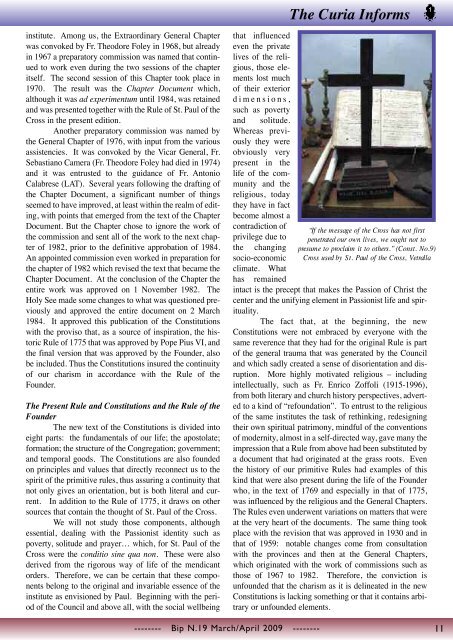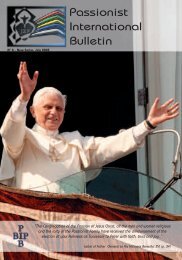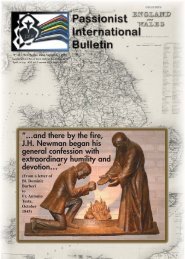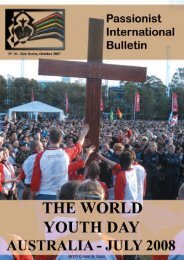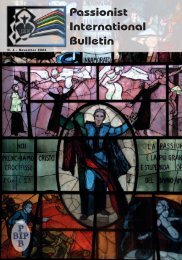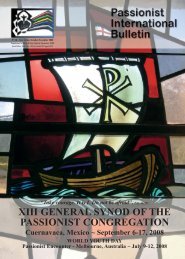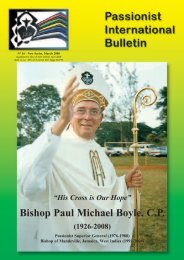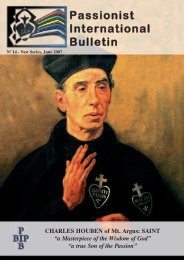The Curia Informs - Passio Christi
The Curia Informs - Passio Christi
The Curia Informs - Passio Christi
Create successful ePaper yourself
Turn your PDF publications into a flip-book with our unique Google optimized e-Paper software.
institute. Among us, the Extraordinary General Chapter<br />
was convoked by Fr. <strong>The</strong>odore Foley in 1968, but already<br />
in 1967 a preparatory commission was named that continued<br />
to work even during the two sessions of the chapter<br />
itself. <strong>The</strong> second session of this Chapter took place in<br />
1970. <strong>The</strong> result was the Chapter Document which,<br />
although it was ad experimentum until 1984, was retained<br />
and was presented together with the Rule of St. Paul of the<br />
Cross in the present edition.<br />
Another preparatory commission was named by<br />
the General Chapter of 1976, with input from the various<br />
assistencies. It was convoked by the Vicar General, Fr.<br />
Sebastiano Camera (Fr. <strong>The</strong>odore Foley had died in 1974)<br />
and it was entrusted to the guidance of Fr. Antonio<br />
Calabrese (LAT). Several years following the drafting of<br />
the Chapter Document, a significant number of things<br />
seemed to have improved, at least within the realm of editing,<br />
with points that emerged from the text of the Chapter<br />
Document. But the Chapter chose to ignore the work of<br />
the commission and sent all of the work to the next chapter<br />
of 1982, prior to the definitive approbation of 1984.<br />
An appointed commission even worked in preparation for<br />
the chapter of 1982 which revised the text that became the<br />
Chapter Document. At the conclusion of the Chapter the<br />
entire work was approved on 1 November 1982. <strong>The</strong><br />
Holy See made some changes to what was questioned previously<br />
and approved the entire document on 2 March<br />
1984. It approved this publication of the Constitutions<br />
with the proviso that, as a source of inspiration, the historic<br />
Rule of 1775 that was approved by Pope Pius VI, and<br />
the final version that was approved by the Founder, also<br />
be included. Thus the Constitutions insured the continuity<br />
of our charism in accordance with the Rule of the<br />
Founder.<br />
<strong>The</strong> Present Rule and Constitutions and the Rule of the<br />
Founder<br />
<strong>The</strong> new text of the Constitutions is divided into<br />
eight parts: the fundamentals of our life; the apostolate;<br />
formation; the structure of the Congregation; government;<br />
and temporal goods. <strong>The</strong> Constitutions are also founded<br />
on principles and values that directly reconnect us to the<br />
spirit of the primitive rules, thus assuring a continuity that<br />
not only gives an orientation, but is both literal and current.<br />
In addition to the Rule of 1775, it draws on other<br />
sources that contain the thought of St. Paul of the Cross.<br />
We will not study those components, although<br />
essential, dealing with the <strong>Passio</strong>nist identity such as<br />
poverty, solitude and prayer… which, for St. Paul of the<br />
Cross were the conditio sine qua non. <strong>The</strong>se were also<br />
derived from the rigorous way of life of the mendicant<br />
orders. <strong>The</strong>refore, we can be certain that these components<br />
belong to the original and invariable essence of the<br />
institute as envisioned by Paul. Beginning with the period<br />
of the Council and above all, with the social wellbeing<br />
that influenced<br />
even the private<br />
lives of the religious,<br />
those elements<br />
lost much<br />
of their exterior<br />
d i m e n s i o n s ,<br />
such as poverty<br />
and solitude.<br />
Whereas previously<br />
they were<br />
obviously very<br />
present in the<br />
life of the community<br />
and the<br />
religious, today<br />
they have in fact<br />
become almost a<br />
contradiction of<br />
privilege due to<br />
the changing<br />
socio-economic<br />
climate. What<br />
<strong>The</strong> <strong>Curia</strong> <strong>Informs</strong><br />
“If the message of the Cross has not first<br />
penetrated our own lives, we ought not to<br />
presume to proclaim it to others.” (Const. No.9)<br />
Cross used by St. Paul of the Cross, Vetralla<br />
has remained<br />
intact is the precept that makes the <strong>Passio</strong>n of Christ the<br />
center and the unifying element in <strong>Passio</strong>nist life and spirituality.<br />
<strong>The</strong> fact that, at the beginning, the new<br />
Constitutions were not embraced by everyone with the<br />
same reverence that they had for the original Rule is part<br />
of the general trauma that was generated by the Council<br />
and which sadly created a sense of disorientation and disruption.<br />
More highly motivated religious – including<br />
intellectually, such as Fr. Enrico Zoffoli (1915-1996),<br />
from both literary and church history perspectives, adverted<br />
to a kind of “refoundation”. To entrust to the religious<br />
of the same institutes the task of rethinking, redesigning<br />
their own spiritual patrimony, mindful of the conventions<br />
of modernity, almost in a self-directed way, gave many the<br />
impression that a Rule from above had been substituted by<br />
a document that had originated at the grass roots. Even<br />
the history of our primitive Rules had examples of this<br />
kind that were also present during the life of the Founder<br />
who, in the text of 1769 and especially in that of 1775,<br />
was influenced by the religious and the General Chapters.<br />
<strong>The</strong> Rules even underwent variations on matters that were<br />
at the very heart of the documents. <strong>The</strong> same thing took<br />
place with the revision that was approved in 1930 and in<br />
that of 1959: notable changes come from consultation<br />
with the provinces and then at the General Chapters,<br />
which originated with the work of commissions such as<br />
those of 1967 to 1982. <strong>The</strong>refore, the conviction is<br />
unfounded that the charism as it is delineated in the new<br />
Constitutions is lacking something or that it contains arbitrary<br />
or unfounded elements.<br />
-------- Bip N.19 March/April 2009 -------- 11


